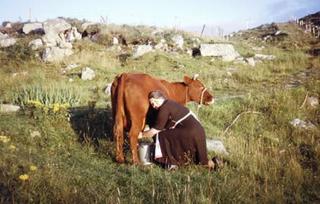 I just finished reading Ruby's link about Horizon's somewhat-organic "organic" milk. Thank you, Ruby.
I just finished reading Ruby's link about Horizon's somewhat-organic "organic" milk. Thank you, Ruby.I'm not averse to companies making an effort to produce a cleaner product. Why should I be? If Horizon wants to abstain from pumping their dairy cows with hormones and antibiotics, more power to them. I'll even go along with them blasting that fact to sell more product.
What I won't go along with is their use of the term "organic". If "organic" means allowing cows to pasture, and Horizon doesn't allow their cows to pasture, then the milk doesn't qualify as "organic". Simple.
It's a crime when a company reaps profit from bastardization of the term. I see it as a problem of enforcement, which in turn is a problem of big business lobbying.
From the Salon.com article:
... the USDA has been lax in enforcing current organic standards, which remain vague, and in creating strict new ones. ... Given the USDA's failures, confinement dairies like Horizon continue to profit at the expense of the nation's small, independent dairies -- ones that do follow organic principles and produce the healthiest milk possible for people, cows and the environment.One solution, raised by my colleague, is for an independent institution to establish strict standards for "organic" and have purveyors of true organic product pay a nominal fee for their seal. It's disappointing we can't rely on government and our taxes to provide this assurance.
Updates
- In April of this year the above Salon article was posted. It stated that The Cornucopia Institute had filed three formal complaints with the USDA alleging the agency was lax in its enforcement of regulation at Horizon's dairy operations. It threatened to sue the agency for failure to address those issues.
- On August 16 of this year, the National Organics Standards Board (a USDA advisory board), with input from the Cornucopia Institute, passed a guidance document that closed loopholes and created strict requirements for organic dairy farmers. (It would have cost Horizon big bucks to comply.)
- On August 16 of this year (the same day!), the USDA without warning rejected the NOSB's recommendation. Says Ed Loyd, press secretary to the Secretary of Agriculture:
"We don’t know whether there is need for additional rule making or for guidance to the industry."
- On September 13 of this year, John Mackey, chairman of Whole Foods Market, disturbed by the lack of USDA regulation, decided to enlist his own standards:
"We will clearly label products that are not animal compassionate so our customers can be fully informed about their practices. We don’t want to see organic standards diluted down to where they don’t mean what consumers think it means."
No comments:
Post a Comment